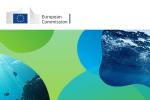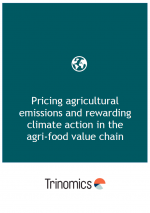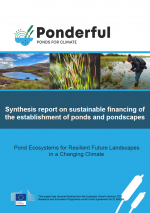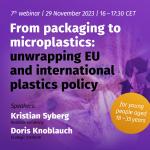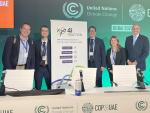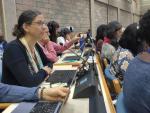Ecologic Institute Newsletter No 255 – December 2023
- Ecologic Institute Newsletter
Mission Ocean and Waters – Service Portal
The European Mission Ocean and Waters service portal is online. This portal is your one-stop-shop for the mission "Restore our ocean and waters by 2030". It provides information and support services to help you get involved in restoring our oceans and waters. You can follow the progress of the Mission as well as actions and activities of the lighthouse projects, find funding and investment opportunities related to the Mission, use the Mission library to learn about and share innovative solutions for ocean and waters restoration, and connect with other citizens and stakeholders. Visit the portal and become part of the mission!
Pricing Agricultural Emissions and Rewarding Climate Action in the Agri-food Value Chain – Report
DG CLIMA's recent study entitled "Pricing Agricultural Emissions and Rewarding Climate Action in the Agri-food Value Chain" suggests that robust economic incentives could significantly enhance climate action in EU agriculture and land sectors. The study assesses five options for emissions trading systems, emphasizing the importance of effective monitoring of emissions and carbon removals. Although there are several policy options, linking LULUCF to an agricultural emissions trading scheme poses climate risks. Questions remain, highlighting the need for improved tools and collaboration with farmers for a sustainable transition. Dive into the study for detailed insights.
Mapping and Analysis of CAP Strategic Plans – Report
The Common Agricultural Policy (CAP) is a key lever to support the transition towards sustainable agricultural production in Europe. However, successive reforms have been incremental and modest with regards to environmental objectives. This report presents a first assessment of the Member States' choices made in their CAP Strategic Plans directing the EUR 307 billion in funding allocated by the Commission for the period 2023-2027 to support agriculture and rural areas. The study presents a detailed mapping of farm practices supported by the CAP, and highlights the contributions made by Strategic Plans towards the sustainable management of natural resources, climate and biodiversity.
Water Resilience through Water Balances, Ecological Flows and Water Allocation Mechanisms – Reports
As climate change accelerates, the effects of water scarcity and droughts in Europe are becoming increasingly alarming. The implementation of water balances, ecological flows and water allocation mechanisms are key to increasing water resilience. Ecologic Institute, in collaboration with Fresh Thoughts, has produced three background reports on these topics in cooperation with members of the Ad-hoc Task Group on Droughts and Water Scarcity of the EU Common Implementation Strategy (CIS) for the Water Framework Directive (WFD). The three reports review current practice, identify key challenges in EU Member States and highlight examples of methods and implementation approaches in place. In view of the increasing impact of climate change, the reports emphasize the need to continue exchange and collaboration between Member States with the view to strengthen the implementation of water balances, ecological flows and water allocation mechanisms. Key recommendations for future areas of work are provided.
Sustainable Financing of the Establishment of Ponds and Pondscapes – Synthesis Report
Ponds and pondscapes (a complex of multiple ponds) can serve as Nature-based Solutions (NbS) that address numerous societal challenges, including the need for climate adaptation, biodiversity enhancement, and water management. Financing has been identified as a key barrier that limits the upscaling of nature-based solutions, including pondscapes. This report aims to address this challenge by supporting pondscape developers to answer a simple question: How can I fund my pondscape nature-based solution project?
Nature-based Solutions Sustainable Financing Inventory
The PONDERFUL Sustainable Finance Inventory consists of a total of 22 financing instruments for nature-based solutions (NbS). Each instrument is illustrated by at least one concrete example of the financing instrument in practice. Different financing instruments have different strengths and weaknesses, making them more or less appropriate for different contexts and actors. The Inventory aims to support pondscape developers to understand financing options and identify the financing instruments best suited to their pondscape NbS project.
EU 2040 Climate Target and Framework: The Role of Carbon Removals – Report
Ecologic Institute and the Oeko-Institut explored the role of carbon removals in the EU's climate framework for 2040. The report provides an overview of carbon removal trends in the EU to date and explores possible contributions from natural and technical sinks to reaching the 2040 climate target. With a focus on measures and policies governing and incentivizing carbon removals, the report also examines the extent to which temporary and permanent carbon removals can contribute to achieving the EU's 2040 target.
Climate Litigation in Germany – Speech
Lina-Marie Dück presented a case study examining climate change litigation in Germany at a workshop held online in Beijing and Berlin. The study highlights seven different cases related to climate change mitigation, both at federal and state level and in the context of specific administrative decisions on project approval. The analysis offers a nuanced perspective, especially on the application of the German Federal Climate Change Act in the context of climate-related issues within the German jurisdiction. A key conclusion is the insight that while climate litigation in Germany is mostly useful for raising public awareness of the relevance of climate mitigation and expediting legislative processes, it is unlikely to be as effective in actually promoting climate mitigation as it may seem.
Urban-Rural Linkages and Nature-Based Solutions for Sustainable Development – Speech and Moderation
The Cities Talk Nature Global Engagement Event in Envigado (Colombia) brought together over 100 municipal stakeholders from Europe and Latin America in November 2023 to discuss urban-rural linkages and promote nature-based solutions (NbS). McKenna Davis, coordinator of the INTERLACE project, kicked off the event by emphasizing the importance of cross-regional collaboration and presenting successful examples of project implementation. Natalia Burgos moderated a panel discussion on the critical aspects of promoting urban-rural relations, strategies for urban and land use management, the importance of policy coherence and financing strategies, including possible alliances with the private sector.
Emission Trading on a Global Scale: Can the Dream Become a Reality? – Interview
In the economic climate podcast "The Price is Hot," Benjamin Görlach joined Johannes Eber and Nils Hesse from Die Dezentrale, discussed global trends and developments in the context of emissions trading and CO₂ prices. The discussion covered various topics, including progress, obstacles and the pace of development. A focal point was the impact of the energy crisis on the implementation of CO₂ pricing, revealing that very few countries have withdrawn their plans or reduced their ambitions.
Resilience and Climate Adaptation for the North and Baltic Seas and their Estuaries – Expert Dialogue
The expert dialog of the MEER:STARK project, which took place on 21 November 2023 at the IOW in Warnemünde, emphasized the key role of the link between marine protection and climate adaptation. The discussion with some 30 participants focused on the topic of "Resilience and Climate Adaptation for the North and Baltic Seas and Their Estuaries". Initial project results show that a holistic approach that takes ecological and social aspects into account is crucial for effective strategies in marine protection and climate adaptation. The presentations and BluEs project results highlighted the importance of measures to promote the resilience of ecosystems and the need to communicate complex scientific content in an accessible way. The results will guide the upcoming events of the MEER:STARK project to further strengthen the dialog and collaboration with stakeholders.
From Packaging to Microplastics: Unwrapping EU and International Plastics Policy – Webinar
Ecologic Institute hosted a webinar on plastic pollution in the EU and globally with environmental, chemical and policy experts on November 29, 2023. Participants learned more about the causes and consequences of plastic pollution, the EU plastic policy and the Global Plastics Treaty, intended as a new instrument to combat plastic pollution. The webinar was part of a series for young people in Europe who are interested in the Green Deal.
Ecologic Institute at COP28
The annual climate change summit in 2023 (COP28) took place in Dubai, UAE. Negotiators from all around the world assembled to discuss the implementation of the Paris Agreement, undertaking the first ever global stocktake of progress towards meeting these goals. Ecologic Institute attended the talks with a delegation of four colleagues, providing legal advice to the EU delegation and discussing insights from ongoing research on innovative policy instruments.
UN Negotiations on a Potential Plastics Agreement
Doris Knoblauch spent a week as an observer at the UN negotiations in Nairobi and provided various negotiating delegations with scientific information as part of the (Scientist's Coalition for short). The Scientist's Coalition is an independent, global network of scientists conducting research on plastics, chemicals and health, covering various disciplines and aspects. A team was on site to answer any outstanding questions swiftly, scientifically and independently. For instance, Doris Knoblauch contributed to the Fact Sheet Plastics 101.
How the "Eco" Plastic Pirates Team Fights Plastic Pollution in the Havel
October 2023 was the time for Ecologic Institute's "Plastic Pirates" team to leave their desks and set off on a quest for plastic waste. Braving the autumnal weather, the "Eco Plastic Pirates" explored the Havel River in Berlin-Spandau and made some interesting discoveries. Among their findings were 502 cigarette butts, 120 bottle caps, and 45 plastic bags. Additionally, various other types of waste were uncovered, including empty drink pouches, Hertha BSC stickers, broken lighters and an abundance of glass shards. The team's discoveries highlight societal issues related to single-use items and the urgent need to raise awareness of proper waste disposal.
Contents
- Publications
- Mission Ocean and Waters – Service Portal
- Pricing Agricultural Emissions and Rewarding Climate Action in the Agri-food Value Chain – Report
- Mapping and Analysis of CAP Strategic Plans – Report
- Water Resilience through Water Balances, Ecological Flows and Water Allocation Mechanisms – Reports
- Sustainable Financing of the Establishment of Ponds and Pondscapes – Synthesis Report
- Nature-based Solutions Sustainable Financing Inventory
- EU 2040 Climate Target and Framework: The Role of Carbon Removals – Report
- Recent: Presentations and Events
- Climate Litigation in Germany – Speech
- Urban-Rural Linkages and Nature-Based Solutions for Sustainable Development – Speech and Moderation
- Emission Trading on a Global Scale: Can the Dream Become a Reality? – Interview
- Resilience and Climate Adaptation for the North and Baltic Seas and their Estuaries – Expert Dialogue
- From Packaging to Microplastics: Unwrapping EU and International Plastics Policy – Webinar
- News
- Ecologic Institute at COP28
- UN Negotiations on a Potential Plastics Agreement
- How the "Eco" Plastic Pirates Team Fights Plastic Pollution in the Havel
